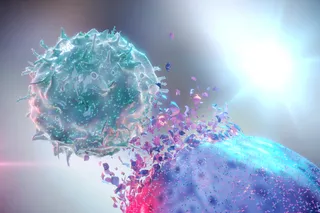What's the News: The bacterial hordes that call your mouth home---and yes, even if you brush rigorously, you've got 'em---are generally a pretty benign bunch. Mostly they just mooch around, snagging tastes of whatever you're eating, but Streptococcus mutans
, the bad boy that causes cavities, releases tooth-corroding acid whenever you eat sugar. Even mouthwash that kills everything it touches can't save you from the ravages of S. mutans in the long term; it just grows back, along with the rest of your bacteria. Scientists who study the mouth microbiome
, however, think that a mouthwash that kills S. mutans and leaves the rest of the bacteria to take over S. mutans's real estate could spell the end of cavities. In a small clinical study
last year, one team found that one application of the mouthwash knocked down S. mutans levels, and that harmless bacteria grew back in its place. ...













